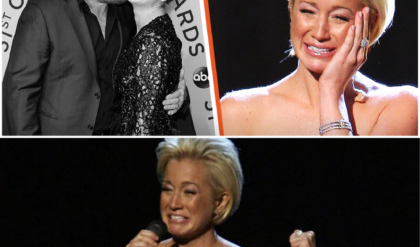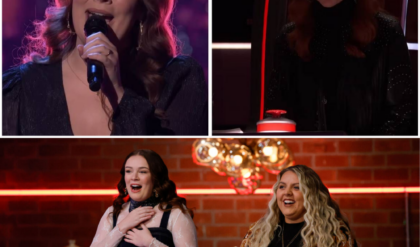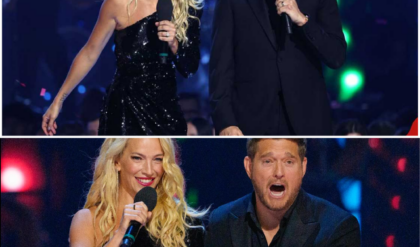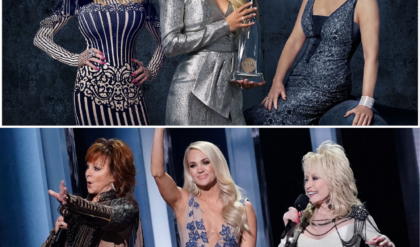In the eerie, upside-down world of Stranger Things, where telekinetic teens battle interdimensional monsters and found family bonds outshine blood ties, the line between fiction and reality has always blurred just enough to enchant audiences. For nearly a decade, Netflix’s cultural juggernaut has captivated millions with its nostalgic ’80s vibes, pulse-pounding horror, and heartfelt portrayals of loyalty amid chaos. At its core pulses the surrogate father-daughter duo of Eleven (Millie Bobby Brown) and Jim Hopper (David Harbour)—a grizzled cop turned reluctant guardian whose gruff affection grounds the show’s wildest escapades. Fans have swooned over their on-screen chemistry, a beacon of resilience in Hawkins’ perpetual peril. But as the clock ticks down to the premiere of the fifth and final season on November 26, 2025—just weeks away—a bombshell report has ripped the veil from this idyllic dynamic, exposing a rift so deep it threatens to taint the series’ triumphant send-off.
According to insiders close to the production, Millie Bobby Brown, the 21-year-old British phenom who skyrocketed to fame at age 12 as the buzz-cut powerhouse Eleven, filed a formal complaint against her co-star David Harbour for harassment and bullying in the tense months leading up to filming Season 5. The allegations, described as voluminous—”pages and pages” of detailed accusations—paint a picture of an environment turned toxic, where what began as a protective mentorship allegedly devolved into something far more damaging. Crucially, sources emphasize that none of the claims involve sexual misconduct, but the emotional toll appears profound, prompting an exhaustive internal investigation that dragged on for several months. During principal photography, which wrapped in December 2024 after delays from Hollywood strikes, Brown insisted on—and was granted—the constant presence of a personal representative on set, a silent sentinel ensuring her safety in scenes that demanded the pair’s closest collaboration.
This revelation, first broken by the Daily Mail and quickly rippling through entertainment outlets worldwide, lands like a Demogorgon in the midst of Stranger Things‘ victory lap. With a teaser trailer dropped just days ago, hyping a multipart rollout—four episodes on November 26, three more on Christmas Day, and a nail-biting finale on New Year’s Eve—the timing couldn’t be more precarious. Netflix, the streaming behemoth that has poured hundreds of millions into the franchise, has stonewalled queries, offering no denial or confirmation. Representatives for both Brown and Harbour, the 50-year-old Emmy-nominated actor known for his booming laugh and everyman charm, have similarly zipped their lips. In a town where silence often screams volumes, the void feels deafening. As fans gear up for what promises to be an emotional farewell to Hawkins, the question looms: Can art and artist—or in this case, co-stars—coexist when trust has fractured?
To understand the chasm, one must rewind to 2016, when Stranger Things burst onto screens like a synth-driven fever dream. Created by the Duffer Brothers, Matt and Ross, the series drew from Stephen King’s small-town terrors and Steven Spielberg’s suburban wonders, blending them into a binge-worthy cocktail of friendship, first love, and otherworldly dread. Millie Bobby Brown, then a wide-eyed 12-year-old from Bournemouth, England, auditioned on a whim after her parents spotted a casting call. Her raw audition tape—delivered in a stark room with nothing but a monologue about loss—sealed her as Jane Ives, the lab experiment reborn as Eleven. Overnight, she became a global icon, her shaved head and Eggo-waffle obsession meme-ified into pop culture lore.
David Harbour, meanwhile, was the grizzled vet injecting heart into the ensemble. A Juilliard-trained theater actor with a resume stacked with indie darlings like Quantum of Solace and Black Widow, Harbour brought a world-weary authenticity to Hopper, the Hawkins chief of police haunted by his daughter’s death. Their characters’ arc—from wary allies in Season 1 to unbreakable family by Season 4—mirrored a real-life rapport that Harbour himself championed. In interviews, he often gushed about meeting Brown at 11, during the Atlanta shoots for the pilot. “She’s like my daughter,” he’d say, his voice cracking with paternal pride. On the 2021 podcast That Scene with Dan Patrick, Harbour delved deeper, admitting a “deep fatherly affection” born of worry. “I saw this kid thrust into fame, and it scared me,” he confessed. “The pressure, the paparazzi—it’s a meat grinder. I wanted to shield her, teach her to navigate it without losing herself.”
Brown reciprocated the warmth publicly. In a 2018 chat with Refinery29, the then-14-year-old described their bond as authentically familial: “We get angry at each other, we fight like father and daughter, but we always come back stronger.” Off-set antics fueled the narrative—Harbour pranking her with fake spiders (ironic, given the Upside Down’s critters), Brown teasing him about his bear-like hugs. Red carpet moments captured them arm-in-arm at premieres, Harbour’s arm slung protectively over her shoulders. It was the stuff of feel-good press kits, a counterpoint to the show’s darker themes. But whispers of strain emerged subtly over the years. As Brown matured—blossoming into a multifaceted star with hits like Enola Holmes and her Netflix rom-com Damsel—her voice grew bolder. In a 2022 Seventeen cover story, she spoke candidly about the perils of early fame, hinting at “unsupportive” figures in her orbit without naming names. Fans speculated, but the Hopper-Eleven glow persisted.
Enter the shadow of Season 5, the endgame scripted to eclipse all prior horrors. Filming kicked off in January 2024 after the 2023 WGA and SAG-AFTRA strikes, with the Duffers vowing a tighter, eight-episode arc focused on closure. Budget ballooned to $270 million, sets expanded to include a fully realized Upside Down, and cast salaries soared—Brown reportedly commanding $14 million. Yet, behind the spectacle, tensions reportedly simmered. Sources claim Brown’s complaint surfaced in late 2023, just as pre-production ramped up. The document, allegedly spanning dozens of pages, chronicled a pattern of behavior: belittling comments during rehearsals, dismissive attitudes toward her input on scenes, and an escalating sense of intimidation that made collaborative moments unbearable. “It wasn’t one incident,” an insider told reporters. “It was a buildup, eroding her confidence when she needed support most.”
The production’s response was swift and procedural. Netflix, no stranger to workplace probes after scandals on sets like The Ranch, launched an independent investigation involving HR, legal, and third-party consultants. It stretched from fall 2023 into early 2024, overlapping with script revisions and table reads. Brown, drawing on her experience as a producer on A Family Affair, advocated fiercely for safeguards. Her rep—a trusted advisor from her agency WME—became a fixture, shadowing her through intimate Hopper-Eleven beats like a quiet family dinner turned portal standoff. “She felt empowered taking this step,” the source noted. “But it was heartbreaking; this was supposed to be their swan song.”
Harbour, for his part, has maintained a low profile amid the storm. Post-wrap, he jetted to Europe for press on Thunderbolts, his MCU return as the anti-hero Red Guardian, but noticeably absent from the Season 5 trailer unveiled last week. Fans clocked it immediately: While Brown, Finn Wolfhard, and Sadie Sink dominated the footage with fierce stares and flickering lights, Hopper’s presence was reduced to archival clips and vague teases. Social media erupted—hashtags like #WhereIsHopper trended alongside #JusticeForMillie. On X (formerly Twitter), reactions poured in like a gate opening. “If David’s bullying the girl he called his ‘daughter,’ what does that say about the ‘family’ narrative?” one user fumed, racking up thousands of likes. Supporters rallied for Brown: “She’s been carrying this show since she was a kid. Protect her at all costs.” Others urged caution: “Wait for facts—don’t cancel Hopper yet.” A viral thread dissected old clips, resurfacing Harbour’s podcast quips about “tough love” in mentoring, now reframed through a sharper lens.
Complicating the narrative is Harbour’s personal tumult. Just weeks ago, his ex-wife, singer Lily Allen, dropped a memoir-tinged album laced with barbs about their 2020 divorce. Tracks alluded to emotional manipulation and infidelity, painting Harbour as a charismatic but controlling force. Though the split predates Brown’s complaint, the timing has fueled speculation: Was this a pattern? Allen, in a promo interview, sidestepped direct ties but quipped, “Fame amplifies flaws—good and bad.” Harbour, promoting his book Published Under a Pseudonym earlier this year, owned his imperfections: “I’ve yelled too loud, pushed too hard. Growth is messy.” Yet, in Stranger Things‘ pressure cooker, where long hours breed frayed nerves, such admissions ring hollow to detractors.
This isn’t Stranger Things‘ first brush with controversy. Back in 2018, amid Season 3 buzz, anonymous crew complaints of a “hostile” atmosphere—long days, creative clashes—prompted a Netflix review. The streamer cleared the cast but implemented wellness checks and intimacy coordinators for later seasons. Brown herself has been vocal on set equity, launching the Florence by Mills foundation to combat child labor in entertainment. Her complaint, then, feels like an evolution of that advocacy, a young woman reclaiming agency after a childhood defined by others’ visions.
As November 26 dawns, the stakes skyrocket. Stranger Things isn’t just a show; it’s a generation’s touchstone, grossing billions in merch and spin-offs. Season 5’s multipart drop—echoing Squid Game‘s strategy—aims to sustain watercooler frenzy through the holidays. But with Hopper’s fate teased as a sacrificial linchpin (spoilers: that Russian prison escape in Season 4 sets up a redemption arc), will audiences cheer or cringe? Brown, ever the diplomat, has teased in recent Variety chats: “This season is about healing old wounds—on and off screen.” Harbour, in a rare post-trailer IG story, posted a cryptic photo of a bear (his spirit animal) with the caption: “Strength in vulnerability.”
In Hollywood’s hall of mirrors, where heroes topple and villains humanize, this saga underscores a brutal truth: Even in the fight against the unknown, the real monsters lurk in unchecked power dynamics. For Brown, it’s a phoenix moment—emerging from Eleven’s shadow as a force unapologetic. For Stranger Things, it’s a test of endurance: Can the party survive its own unraveling? As gates creak open and lights dim, one thing’s clear—the final season won’t just close a chapter. It’ll redefine what family really means, scars and all.





